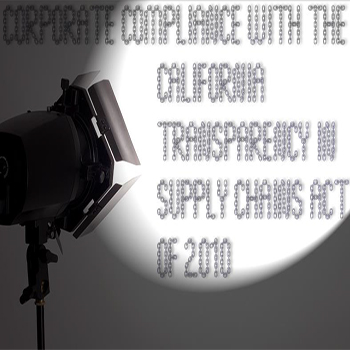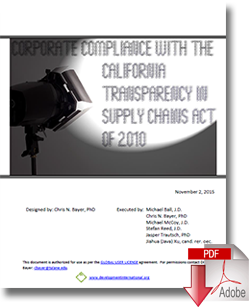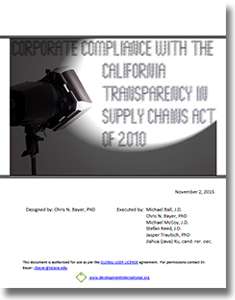Majority of Companies Not Legally Compliant With California Trafficking/Slavery Disclosure Law

With California being the 8th largest economy in the world, it may not come as a surprise that CA-TISCA affects companies with combined revenues of $17 trillion per year, among them many Fortune 1000 companies, and many are not legally compliant.
The California Transparency in Supply Chains Act of 2010 may cause problems for some managers, a recent report suggests.
Development International (DI), a not-for-profit specialized in evaluation, published a report that rates the legal compliance and affirmative conduct of 1,504 companies’ anti-human trafficking and slavery-related disclosure statements.
This is the same group that evaluated SEC filers’ corporate disclosures with Dodd-Frank Section 1502 (conflict minerals) now evaluated companies’ disclosures required by the California Transparency in Supply Chains Act of 2010 (SB 657).
The California Transparency in Supply Chains Act of 2010 (“CA-TISCA”) requires major retailers and manufacturers doing business in California, with global receipts in excess of $100 million, to disclose their “efforts to eradicate slavery and trafficking in their direct supply chains for tangible goods offered for sale” (California Civil Code Section §1714.43). By marrying aspects of Proposition 65 and Title III of the USA Patriot Act, CA-TISCA is indeed unique.
DI’s study is the first to:
1. Identify the majority of qualifying companies;
2. Find their disclosure statement on their website;
3. Score each company’s disclosure compliance with CA-TISCA; and
4. Score each company’s affirmative conduct vis-a-vis CA-TISCA.
With California being the 8th largest economy in the world, it may not come as a surprise that CA-TISCA affects companies with combined revenue of $17 trillion per year, among them many Fortune 1000 companies.
Overall, compliance performance varied greatly. The average disclosure compliance score was 60%. But only 41% of companies were found to have a corporate disclosure score on or above the 70% mark.
“It would behoove any reputable company that qualifies for SB 657 to make sure it is at least legally compliant,” Dr. Chris Bayer, the study’s Principal Investigator, stated. “As at now, many are not.”
In order to ascertain the extent of corporate-driven action relevant to Anti-Human Trafficking and Slavery, DI separately assessed the reported degree of affirmative conduct – the extent to which a company reported positive action.
The average affirmative conduct score of companies with statements was 31%. Fourteen (14%) percent of companies were found to have an affirmative corporate conduct score on or above the 70% mark. Fifteen (15%) percent of companies also noted that they were still working on one or more CA-TISCA-relevant items.
“A disclosure law such as CA-TISCA opens companies up to the court of consumer opinion,” says Bayer. “And the court of consumer opinion in the 21st century, with sheer limitless information at its fingertips, is a force with which must be reckoned.”
In an interview with Supply Chain Management Review, Bayer said that the political battle over immigration may also alter the dialogue on slavery.
“The California Transparency law seems to be producing a cascading effect, from manufacturers/retailers back down the supply chain,” he said. “I’m not sure changes to immigration law would be an intervening variable here… but one could say it would be a combination of mandated disclosure law, independent research, investigative journalism, an ethical consumer culture, along with the responsible investing community that could make even a larger impact on this issue.”
Human Trafficking and Slavery-Like Practices
Parallel to our contributions to the subject of the Worst Forms of Child Labor (WFCL) and Forced Adult Labor (FAL), DI researchers now investigate the extent of company-level compliance with the California Transparency in Supply Chains Act of 2010, almost four years since the Act’s disclosure provisions went into effect on January 1, 2012.
1,504 qualifying companies’ statements are individually assessed against eight (8) compliance criteria based on the law’s core requirements, resulting in a compliance score, and seven (7) affirmative conduct indicators, yielding an affirmative conduct score. In addition, the study collects 19 pertinent data points of interest per disclosure.
Scrutinizing all pertinent corporate disclosures provides a first macro perspective not only of the compliance landscape but also the efforts companies are making to confront human trafficking and slavery-like practices in their supply chain.
- Click here to download a copy of our Corporate Compliance with the California Transparency in Supply Chains Act of 2010 report.
- Click here the report’s press release.
- An in-depth break-down of both a company’s compliance and affirmative conduct score may be obtained as an additional service offered by DI.
- For an up-to-date, searchable table with the evaluation status, URL to statements and scores of qualifying companies, click here.
- For a comparison between a company’s Dodd-Frank S1502 compliance score and that of CA-TISCA (SB 657), view this searchable table. The average score divergence, for 814 companies that are subject to both laws, is 54.8%.
Related: U.S. Representatives Propose Supply Chain Law Following Slavery Report

Article Topics
Development International News & Resources
Corporate Compliance with the California Transparency in Supply Chains Act of 2010 Majority of Companies Not Legally Compliant With California Trafficking/Slavery Disclosure LawLatest in Supply Chain
U.S. Manufacturing is Growing but Employment Not Keeping Pace The Two Most Important Factors in Last-Mile Delivery Most Companies Unprepared For Supply Chain Emergency Microsoft Unveils New AI Innovations For Warehouses Let’s Spend Five Minutes Talking About ... Malaysia Baltimore Bridge Collapse: Impact on Freight Navigating TIm Cook Says Apple Plans to Increase Investments in Vietnam More Supply ChainAbout the Author















